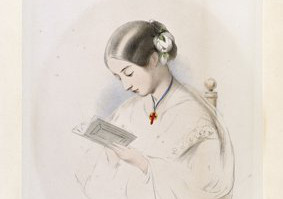Florence Nightingale
Peter Brimacombe
Florence Nightingale will always be remembered as one of Britain’s more unlikely war heroes – celebrated for her work beyond the field of battle, rather than on it. After rising to fame as the ‘Lady with the Lamp’ during the disastrous Crimean War, where her pioneering work as a nurse helped to save the lives of countless injured soldiers, she dedicated much of the rest of her life in Britain to improving standards of hygiene and care in the medical profession, establishing professional standards of training and campaigning for reforms to nursing practice.
In honour of these remarkable achievements, as well as the humanitarian work of nurses around the world, Florence’s birthday on 12 May has been designated International Nurses Day – an annual event that is marked with a special service at Westminster Abbey in London.
Born the youngest daughter of a wealthy and well-connected family in 1820, Florence was named after the Italian city her parents were visiting during a grand tour of Europe at the time of her birth. Florence’s elder sister had been born in Naples the year before and was called Parthenope, after the Greek name for the city.
Florence grew up to be tall and slender, with rich brown hair worn in a severe style, a prominent nose and a quizzical expression. Although she did not inherit her mother’s beauty, Florence never lacked suitors and was turning down marriage proposals well into middle age before ending her days a spinster.
Throughout her life Florence experienced poor health, suffering from a chronic form of brucellosis, a flu-like disease she contracted during her time in the Crimea. In later life, she became a semi-invalid and recluse, despite living until she was ninety years old. As her condition worsened, Florence is said to have alleviated the acute pain with opium, a drug that could be bought in most pharmacies in Victorian times.
Throughout her life, Florence was deeply religious and attributed her attraction to nursing as a spiritual calling. After overcoming her parents’ initial opposition to her choice of vocation, which they felt was below her social standing, Florence completed her training in continental Europe before assuming an unpaid position as Superintendent for the Establishment for Gentlewomen During Illness in London`s Harley Street in 1853.
The following year, reports of the disgraceful treatment of the wounded during the ill-conceived and badly-executed Crimean campaign, began to appear in The Times and other national newspapers, prompting Florence’s friend and recently-appointed War Minister, Sidney Herbert, to ask her to take a group of nurses to Scutari, the British base hospital on the shores of the Bosporus in Turkey. She arrived there in early November 1854, just in time to receive an influx of badly wounded soldiers from the Battle of Balaclava, now famed for the heroic, yet ultimately futile ‘Charge of the Light Brigade’.
Scutari was a former Turkish army barracks that was decrepit, over crowded and singularly unsuitable as a hospital. The wounded were dreadfully treated, many lying on filthy lice-ridden mattresses on the floor, lacking the most basic of medical supplies. Amputations were carried out without anesthetic in unsterilised wards and thousands of soldiers were dying from cholera, typhus and dysentery during the terrible Crimean winter. Amid this squalor and suffering Florence proved herself to be a devoted carer and a cunning negotiator, regularly challenging the military authorities to provid




